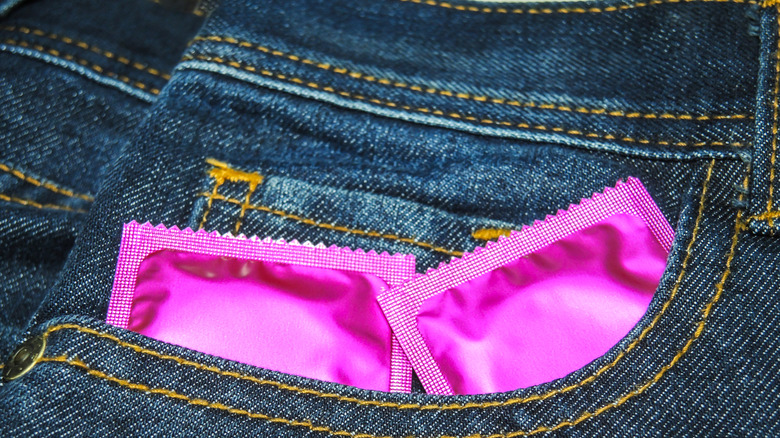Can You Get An STD From Anal Sex?
Sexually transmitted diseases (STDs) are something that most people want to avoid, and being aware of how to best protect yourself and your sexual partners from STDs is key to ensuring that risk of transmission is kept to a minimum. Anal sex, which involves stimulation of the anus, is a form of sexual activity that can lead to the potential spread of STDs (via Healthline). Sexual activity involving the anus can include oral, fingering, and penetration through genitalia and sex toys, all of which carry the risk of spreading infectious diseases.
According to the U.K. National Health Service (NHS), anal sexual encounters are more likely to cause the spread of STDs than other penetrative and sexual acts, which is largely attributed to the thin and fragile lining of the anus. Commonly transmitted sexual health diagnoses from anal sexual activity include syphilis, chlamydia, gonorrhea, hepatitis A and hepatitis B, HIV, and both genital warts and genital herpes.
Penetration of the anus isn't the only form of anal sex that can lead to the transmission of STDs. As Healthline points out, tearing of the anal lining can lead to cuts, and infections from bacteria entering the body. Oral-anal sex can lead to the spread of bacteria like E. coli, and anal fingering can also cause the spread of sexually transmitted diseases, notes the NHS.
Before having sex with a new partner, and in between anal sexual encounters, it's a good idea to seek STD testing to be knowledgeable about your health.
Practicing safe anal sex
Like other forms of sexual intimacy, knowing how to practice anal sex safely is incredibly important for your health. First things first, always seek consent and have an open dialogue with your partner, says Healthline. Remember that consent can be withdrawn at any time, and being honest with your partner about your feelings before, during, and after engaging in anal sex is the best way to create a respectful environment.
If you and your partner decide to perform anal fingering, be certain that fingernails have been clipped, washed, and scrubbed beforehand to reduce your risk of scratching, injury, and potential infection. Don't forget to wash the hands afterward, too.
Use condoms properly if you and your partner choose to try anal penetration. Sheer Glyde dams can be used during other types of anal sex, notes Planned Parenthood. In addition to using condoms and other barriers to protect from the spread of STDs, other ways to practice safe anal sex include receiving the HPV vaccine, and using a new condom upon each separate act of penetration.
Since the anus doesn't lubricate itself, be sure to use plenty of lube to prevent tearing. Should you choose a latex condom for protection, be certain that you're pairing it with a water-based lubricant, since oil-based lubricants can damage condoms. If you or your partner are at high HIV risk, talk to your doctor about whether or not you should take a daily dose of pre-exposure prophylaxis (PrEP), suggests WebMD.

